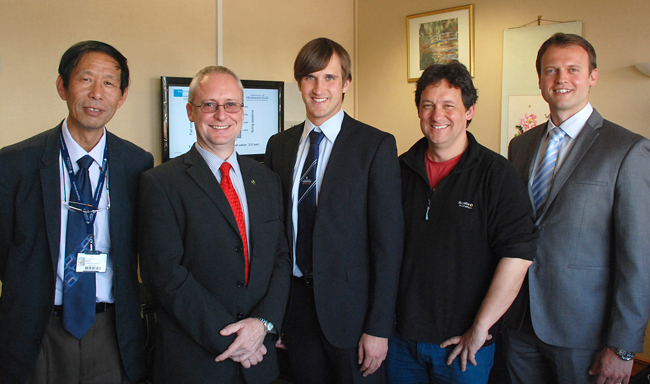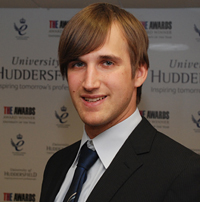50 not out – Professor supervises his 50th PhD student
 Pictured (l-r) are Huddersfield's Dr Fengshou Gu and Professor Andrew Ball, recent PhD student Dr Michael Selig, Professor Karsten Schmidt of the University of Huddersfield's School of Computing and Engineering and Germany's Frankfurt University of Applied Sciences, alongside external examiner Robert Pietruszkiewicz.
Pictured (l-r) are Huddersfield's Dr Fengshou Gu and Professor Andrew Ball, recent PhD student Dr Michael Selig, Professor Karsten Schmidt of the University of Huddersfield's School of Computing and Engineering and Germany's Frankfurt University of Applied Sciences, alongside external examiner Robert Pietruszkiewicz.
Mon, 02 Jun 2014 14:56:00 BST
“...the success rate has been high, with over 95 per cent of PhD candidates achieving their doctorates within the stipulated time...”
THROUGHOUT the world, dozens of experts working at the cutting edge of diagnostic engineering – in vital fields such as emissions reduction – owe a large part of their career success to Professor Andrew Ball and Dr Fengshou Gu at the University of Huddersfield. The two engineers have been close colleagues since the early 1990s and have jointly supervised well over 50 successful candidates for doctoral degrees.
In fact, Professor Ball – who is the University’s Pro Vice-Chancellor for Research and Enterprise – has just reached a personal milestone with his 50th success as a main PhD supervisor. German-born Michael Selig was the successful candidate, after completing his research and thesis investigating the possibility of safety gains if a car’s tyre pressures could be rapidly reduced in emergency braking conditions.
That project was Dr Selig’s own conception, but the great majority of the 50-plus doctorates that Professor Ball and Dr Gu have supervised were the results of research devised by the two men.
“We will sit down once a year and update the list of research areas we would like to supervise over the next 12 months,” explained Professor Ball. “A large proportion tend to be linked to research grant and contract work or they are in areas where we thought we could bid for funding if we had better background knowledge and the ability to demonstrate some preliminary results.”
Research students will then be appointed to carry out the pioneering work, supervised by Professor Ball and Dr Gu. The success rate has been high, with over 95 per cent of PhD candidates achieving their doctorates within the stipulated time, and in doing so contributing to the knowledge base of the University’s Centre for Efficiency and Performance Engineering, which is headed by Professor Ball with Dr Gu as Principal Researcher.
Green and safety agendas
The two men first teamed up at Manchester University in 1992 and, with their research centre, they relocated to Huddersfield in 2007. Students at the centre come from a wide range of countries – currently including China, Qatar, Libya, Iran, Seychelles, Indonesia and Nigeria as well as the UK – and this means they have spread their expertise all over the world, working for major companies, governments and academic institutions.
Since Professor Ball and Dr Gu began their research supervision more than 20 years ago, there have been many developments in the field of diagnostic engineering and this has been reflected in the nature of research projects. For example, special importance is now attached to the green and safety agendas.
“Compared to 20 years ago, there is now a huge emphasis on improved energy efficiency of plant, plus improved health and safety. When we first collaborated, Dr Gu and I specialised in maintenance engineering – now we specialise in emissions reduction, efficiency improvement, reliability enhancement and failure risk reduction,” said Professor Ball.
“We are doing research into how to make plant safer, more reliable and more efficient and we are clearly demonstrating how those things make the world a better place.”
 50th successful PhD candidate
50th successful PhD candidate
Dr Michael Selig (pictured right) – who recently became Professor Ball’s 50th successful PhD candidate – began degree studies in his native Germany, at the University of Coburg. Its links with the University of Huddersfield meant that he came to the UK for the final year of his degree and was invited to stay on at Huddersfield for MSc research, moving on to a PhD.
He investigated whether reduced tyre pressure – triggered by a car’s emergency braking – could reduce the speed and hence impact of a collision. After extensive tests, Dr Selig placed the emphasis of his research on the influence of tyre pressure on road friction, developing predictive models of tyre behaviour over a wide range of vehicle dynamics and road conditions. “We all know that a low pressure tyre makes a car pull to one side, I wondered if we could use this effect in a controlled manner to improve emergency stopping distance”, said Dr Selig. Using the results from his mathematical modelling, he has designed a special wheel rim which automatically reduces the inflation pressure of a tyre when emergency braking occurs.
Dr Selig’s project successfully earned him a doctoral award and now he says that design optimisation and further testing are needed to demonstrate the potential contribution that his idea could make to vehicle safety.







